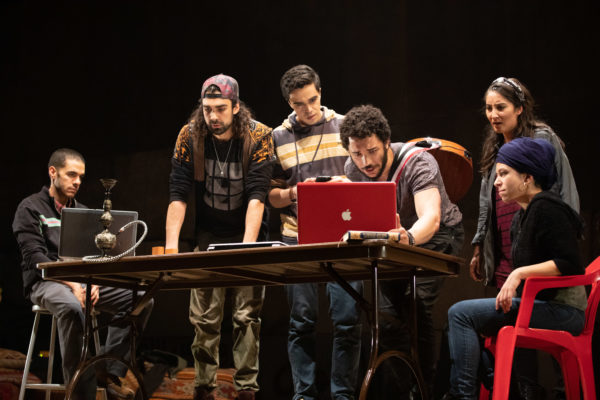Theater Review: “We Live in Cairo” — A Well-Intentioned But Amateurish Musical Take on The Arab Spring
By Christopher Caggiano
Do musicals with honorable intentions deserve a pass when it comes to quality?
We Live in Cairo by Daniel Lazour and Patrick Lazour. Directed by Taibi Magar. Staged by the American Repertory Theater at the Loeb Drama Center, Cambridge, MA, through June 23.

The cast in the American Repertory Theater’s production of “They Live in Cairo.” Photo: Evgenia Eliseeva.
Over the years, there have been numerous musicals whose subject matter was honorable but whose execution was less than stellar. I’ve reviewed inexpert musicals about the Holocaust (The People in the Picture), the plight of transgendered people (Southern Comfort), the Japanese internment camps in World War II (Allegiance), the historical struggle of African Americans (Bella: An American Tall Tale), and the tortured lives of young gay men in Catholic school (Bare: A Pop Opera).
Each of these musicals was eminently noble in its intentions, but none amounted to more than a mediocre exercise in musical theater. In each case, it felt somewhat churlish to carp about copious weaknesses in craft, given that the goal of each piece was so admirable. But it’s not the critic’s job to be a civic cheerleader, but rather to analyze, contextualize, and ultimately render a verdict.
Cambridge’s American Repertory Theater has certainly had its share of would-be inspirational duds over the years, including the woefully solipsistic Witness Uganda in 2014, which played New York City in 2015 under the title Invisible Thread. This season, that ignoble distinction belongs to We Live in Cairo, a painfully well-intentioned but amateurish new musical (receiving its world premiere) with book, music, and lyrics by brothers Daniel and Patrick Lazour.
Hey, don’t get me wrong. It’s encouraging that that this isn’t yet another mercenary Broadway tryout from the A.R.T., like Finding Neverland, Waitress, Pippin, The Gershwin’s Porgy and Bess, Jagged Little Pill, or The Glass Menagerie. It’s heartening to see the A.R.T. doing more than just lining its coffers and padding out Diane Paulus’s resume in commercial theater.
The story of We Live in Cairo takes place during the Arab Spring uprisings of the early 2010s, specifically during the massive protests in Cairo’s Tahrir Square that led to the ouster of Egyptian president Hosni Mubarak in 2011 after 30 years of autocratic rule. The characters are a group of students who participate in the protests, although it’s never really clear exactly what functions they perform in the resistance movement.
Daniel and Patrick Lazour began writing this show in 2013, when the brothers were 19 and 23 respectively. Although the pair apparently have been creating musicals since their high school days, their lack of experience is manifested in almost every aspect of the writing. The dialogue is stilted and expository, albeit peppered with occasional moments of insight. Too much of the book comes in the form of direct-address narration, but even when it’s dialogue between the the characters it comes off as artificial, provided merely to reveal facts that the speakers already know, but are called on to repeat in order to keep the audience up to speed. (An impetus that comedians Nick Kroll and John Mulaney ruthlessly parody as the “one-sided phone call” in their show Oh, Hello on Broadway.) The authors also make several awkward attempts to inject the characters’ personal stories into the narrative.
If delusions of political/cultural self-importance generated credible drama, than We Live in Cairo might have amounted to something. There’s the star-crossed Muslim-Christian couple whose reckoning is conveniently obviated in a cheap narrative trick straight out of South Pacific. And there’s the two men who clearly share a forbidden attraction. But this plot thread is introduced too late and resolved too patly to have make any real impact. Worse still, the show never seems to end, stretching on and on with a succession of false endings that try your patience.
The score to We Live in Cairo is bland and uniform. There’s an idiomatic Middle Eastern sound to the orchestrations, but the songs are dull and virtually tuneless. One could say, well, that’s part of the regional sound the Lazours were going for, but David Yazbek’s glorious score for The Band’s Visit vividly demonstrates that Middle Eastern music, in the context of an American musical, can be rich, varied, and very theatrical. Compounding the problem (and symptomatic of the authors’ inexperience) is the awkward placement of the female vocal parts. What the female cast members are given to sing is generally in an uncomfortable lower register — it forces them to over-articulate to order to make themselves understood.
There’s a certain visceral power to the production’s war-torn scenic design by Tilly Grimes, and especially to David Bengali’s copious projections. Unfortunately, the compelling historical video footage that permeates the show serves as a reminder of the real weight of the events the show portrays — gritty substance that only makes They Live in Cairo look all the more artificial.
Christopher Caggiano is a writer and teacher based in Boston. He serves as Associate Professor of Theater at the Boston Conservatory at Berklee. His writing has appeared in American Theatre and Dramatics magazines, and on TheaterMania.com and ZEALnyc.com.

The Barrington Stage production of Southern Comfort was poignant and powerful.